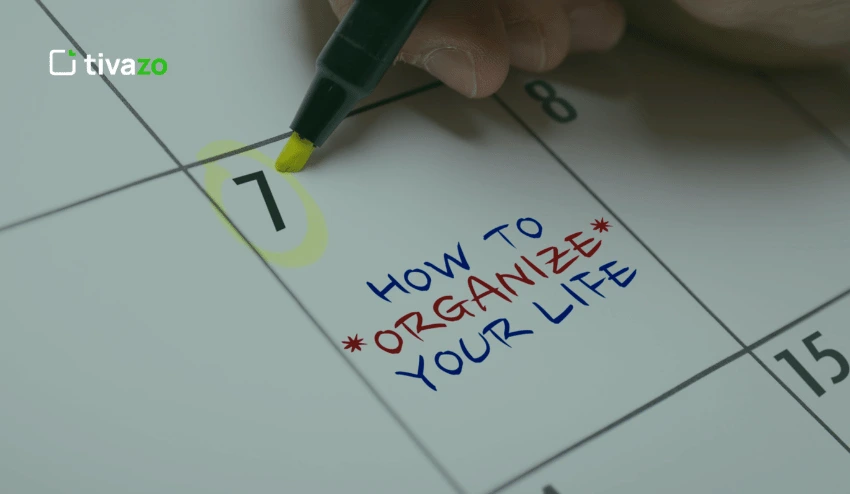Life in this day and age can feel like a tornado with crowded inboxes, ever-growing to-do lists, and schedules that don’t allow for any downtime. If you feel drained, you’re not the only one. Most people do not lack time; they lack systems in order to manage their life.
Organizing your life is not about having neat closets or darn neat desks. Organizing your life is all about clarity, balance and focus to help you achieve your goals without burnout. In this guide we’ll outline 6 smart ways to get back in control (with actionable tips to help you manage your work, health, finances, and relationships).
Key Highlights:
- Why You Need to Organize Your Life
- Smart Ways to Organize Your Life
- Organize your life at different places
- Tools That Help You Organize Your Life
- Common Mistakes People Make While Organizing Life
Why You Need to Organize Your Life (Psychology & Benefits)
Organizing your life has both mental and physical proven perks:
- Reduces stress:
- Studies show that clutter actually increases cortisol levels, leading people to feelings of overwhelm and anxiety. It can become hard on your brain to process a messy environment.
- Boosts productivity:
- With everyone being busier than ever, a clear schedule can help reduce decision fatigue, hence getting you to focus on what really matters.
- Improves health:
- Structured routines will ultimately lend themselves to better sleep, regular exercise, and healthier eating habits.
- Strengthens relationships: Learning how to prioritize your time means that family, friends, and social connectivity don’t suffer.
Overall, when you take the time to organize your life, you’ll find that you are more than just tidying things up; you are actually creating mental space, freeing your energy, and establishing long-term peace of mind.
6 Smart Ways to Organize Your Life
Smart Ways to Organize Your Life are:
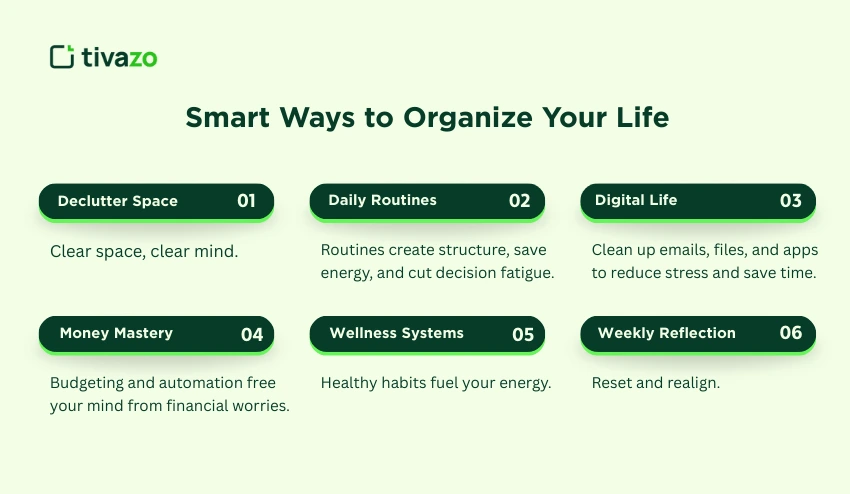
1. Declutter Your Space, Declutter Your Mind
A disorganized area leads to disorganized thoughts. When you find your space cluttered, you are then processing multiple visual distractions and making it difficult to focus on any one task at a time. When you can create organization in your home or work area, you’ll feel calmer, think better, and be able to make decisions effectively.
- Create spaces for work, relaxation, and creativity.
- Use minimalism to decrease your visual distractions.
- Keep a “donation box” around for those items you no longer need.
Decluttering your space is usually the easiest and quickest way to organize your life at home.
2. Master Your Time with Daily Routines
Time is the one resource that you cannot reclaim, and it can easily slip away with no structure. The routines that you develop help you conserve energy, create consistency, and eliminate decision fatigue. Consider routines as your basic foundation that keeps your day in order and predictable.
- Create morning routines (exercise, journal, a plan).
- End the day with an evening wind-down routine (digital detox, daily reflection).
- Use the Eisenhower Matrix to categorize urgent vs important work.
Small routines can collectively create big results; they help you create order from chaos.
3. Organize Your Digital Life (Emails, Apps, Files)
Digital clutter can be as frustrating as physical clutter, as a result of overwhelming emails or hundreds of similar files in no particular order. Digital clutter is a time waster and adds to stress. Setting boundaries and systems for your devices will help you reclaim hours of your life and clear your mind.
- Practice Inbox Zero: archive, delete, or respond immediately.
- Create folders in Google Drive or Dropbox.
- Unsubscribe from unnecessary newsletters.
- Use third-party applications, such as Notion, Trello, or Todoist, to manage projects.
4. Manage Money Like a Pro
Almost everything has something to do with money. When your finances are jumbled up, they create an ongoing background stressor. By getting your budget to work for you and automating payments, you will have less to stress about financially and protect mental bandwidth for growth.
- Establish a monthly budget.
- Automation of bills and savings.
- Consider apps like YNAB, Mint, or PocketGuard.
Your money will lighten your mind, providing clarity and confidence when managed well.
5. Build Health & Wellness Systems
Ultimately, health is everything. Without energy, discipline, and balance in your body, it doesn’t matter how much you schedule, organize, prepare, etc. Systems for sleep, exercise, and nutrition promote strength without deliberation.
- Schedule workouts like they are appointments.
- Prep meals in advance to avoid junk food.
- Aim for 7 – 8 hours of quality sleep.
Your wellness routines will assure your body has the energy your mind needs.
6. Reflect Weekly to Stay on Track
Organization is not something you can “finish” it is an ongoing process. Reflection allows you to see what progress you have made, reset goals, and catch problems before they get out of hand. Checking in weekly helps keep your systems alive and adapting to your lifestyle.
- Evaluate what went well and what did not.
- Re-assess priorities for the week ahead.
- Journal your thoughts to clear your mind.
This reflection loop keeps your life on track and helps prevent chaos from creeping in.
Organize Your Life at Home
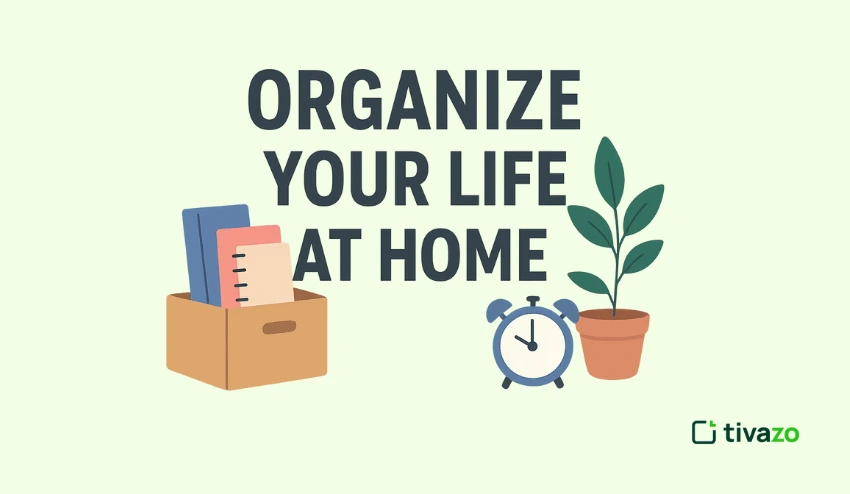
Your home environment dictates the clarity of your mind and overall daily productivity. A cluttered and chaotic at-home space can easily affect your mood, energy level, and focus. By putting in place simple systems of organization throughout your home, you will lessen pointless stress and create a feeling of support rather than overwhelm.
- Implement a “one in, one out” rule (every time you bring in a new item, get rid of one).
- Create family schedules to mitigate conflict.
- Maintain cleaning supplies in all rooms.
Organize Your Life at Work
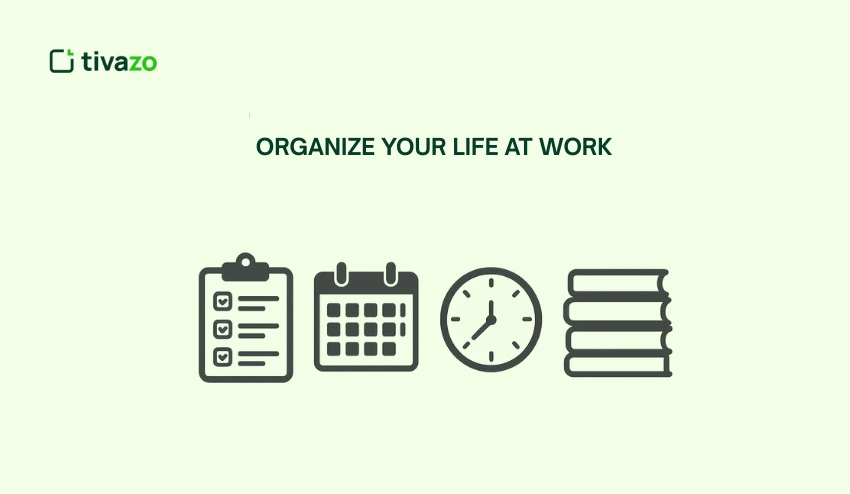
Without structure to your day, work can become chaotic. When you are more intentional with your work habits, you can be more productive while reducing stress and avoiding burnout. When you are able to organize your life workflows so that you not only do more, but also create space for creativity and focus, here is how you are able to enhance your workday.
- Start your day with the hardest task (“eat the frog”)
- By tackling your hardest task first, you will build momentum, and you have already achieved something in the day.
- Batch similar tasks together
- Group blocks of emails, phone calls, or administration so that you won’t have to spend time switching your mindset.
- Limit unnecessary meetings and reclaim your time
- Protect your deep work hours by setting limits on meetings that are not core to your priorities.
Organize Your Life with Finances and Budgeting
Often, people’s financial worries stem from a lack of structure rather than a lack of income. By using everyday money systems, you might reduce your anxiety and your risk for overspending, which may lead to greater stability in the future. Finances can quickly get out of control, leaving you in a reactive mode to your financial problems rather than having your finances work for you. Here’s how to stay organized:
- Track expenses weekly, not just monthly – if you check in weekly, you can visualize your spending behavior, and you can adjust before small financial leaks become larger problems.
- Have separate accounts for bills, savings, and fun – by separating money into different ‘buckets’, you will always be assured that your essentials are covered and have guilt-free spending for fun.
- Build out a 3-6 month emergency fund – this gives you a cushion against unexpected expenses, a job loss, or larger medical emergencies, which all can provide you great peace of mind.
Organize Your Life in Health and Wellness
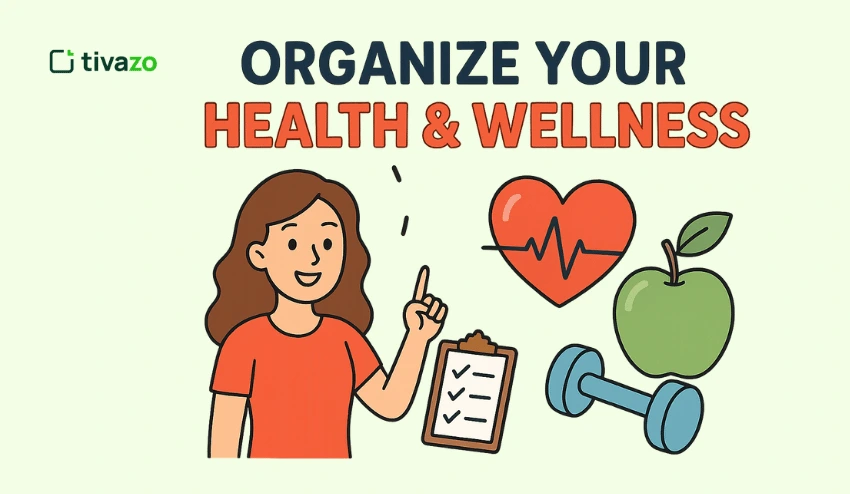
Your health is the basis for productivity and focus. Without organized habits, the best plans in work or finances can go wrong. Staying organized around your health doesn’t just mean exercise; it is about creating sustainable practices to protect your energy, body, and mind.
- Track exercise – use habit trackers or apps.
- Drink water regularly – set small reminders.
- Schedule check-ups – stay ahead of health issues.
Organize Your Life at Relationships & Social Life
More than almost any other factor, our relationships shape our well-being, level of stress, and feelings of happiness. Staying organized socially doesn’t mean scheduling all of your time rigidly; it means creating simple systems to foster meaningful relationships, while also protecting your energy. Here are some suggestions:
- Plan quality time – schedule periodic friend/family visits.
- Remember important dates – set reminders for birthdays/anniversaries.
- Set boundaries – limit contact with toxic influences.
Digital Tools That Help You Organize Your Life
In this day and age, utilizing digital resources can be a huge help in remaining organized. From organizing tasks and keeping notes to scheduling events, the right apps help save time, alleviate mental clutter, and create consistency. Below are some of the best resources to help you organize your life:
- Todoist – A very simple to-do list for tasks and projects to accomplish daily.
- Notion – All-in-one planner for your notes, tasks, and database.
- Google Calendar – manage appointments, deadlines, and reminders.
- Evernote – collect thoughts, ideas, and references in one location.
Common Mistakes People Make While Organizing Life
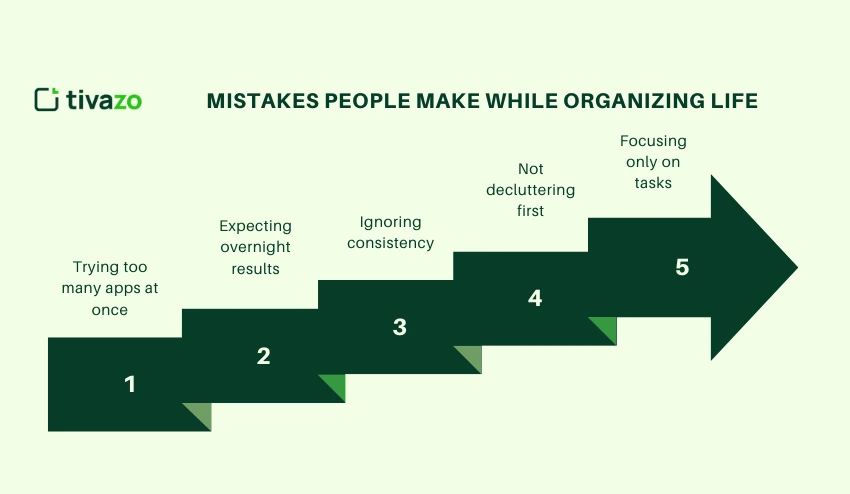
Even with the best of intentions, people still struggle to stay organized, and usually because of some simple yet common mistakes. Understanding and being mindful of these errors will keep you from becoming exasperated, wasting precious effort, and becoming burned out as you create your systems. Some of the biggest mistakes are:
- Trying too many apps at once – juggling multiple tools can create confusion instead of clarity. Start with one or two essentials.
- Expecting overnight results – losing organization takes time and practice, and you shouldn’t be discouraged by gradual progress.
- Ignoring consistency – it doesn’t matter how good your system is or how great your plans are, if you don’t practice them consistently, no system will work.
- Not decluttering first – stacking new systems on top of the chaos of your current situation is not going to work effectively.
- Focusing only on tasks, not mindset – without the right mindset and self-discipline, your organizational efforts will fail. approach and self-discipline.
Automate & Simplify Daily Tasks
Life is busy, with repetitive tasks that steal our time and energy. Automating and simplifying daily tasks allows you to minimize the mental energy you use on daily tasks on autopilot, and you reserve your mental energy for bigger decisions and creative work. Systems and small tools can play a big role in helping you defuse your stress levels and keep an organized life. Here are a few key ideas to bear in mind:
- Automate monthly bills and savings – by making your bills and savings automatic, you get to eliminate repetitive money moves (and hopefully late fees)
- Use reminders and calendar alerts – this is an easy way to keep track of appointments, deadlines, and household chores, without missing a beat or letting things slip through the cracks.
- Simplifying routines – take one or two steps out of most steps in your daily tasks, whether that is meal preparation, morning routines, or cleaning. We all have routines that can be cut down for time and increase friction.
Final Thoughts: Start Small, Stay Consistent
Organizing your life is not about being perfect – it is about making progress. Every system you put in place helps give you back more time, clarity, and freedom. It doesn’t mean that you can’t declutter your belongings, learn to master your routines, or take control of your finances; it means that you need to focus on starting small and being consistent.
